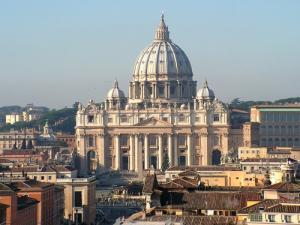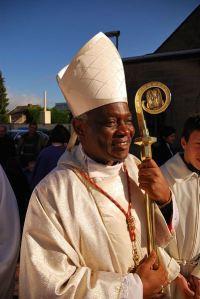News came this morning that Pope Benedict 16th is resigning.
Nine names are said to be papabili (potential popes), frontrunners to succeed Benedict 16th. Among them is an ominous name — Peter Turkson of Ghana, Africa.
It is not just that his name “Peter” is evocative of St. Malachy’s (1094-1148) prophesy that the last pope would be one “Peter the Roman,” Peter Turkson was the person who, in 2011, had called for a “supranational world political Authority,” i.e., a one-world government.
I am therefore re-publishing this post that I had first published on October 26, 2011.
~Eowyn (Feb. 11, 2013)

Two days ago, on October 24, 2011, the Vatican issued a curious document calling for the creation of a “supranational global political Authority” and a central world bank to manage and cure the ills of the world’s economies.
The proposal, “Note on the reform of the international financial and monetary systems in the context of global public authority” (henceforth, “The Note”), was not authored by the Pope but by the Pontifical Council for Justice and Peace (PCJP). Nevertheless, the PCJP is a part of the Roman Curia or the Holy See, the leaders of the PCJP are appointed by the Pope, and The Note liberally references and quotes past and present popes. Given all this, one can only conclude that The Note has Pope Benedict XVI‘s approval.
To read a translation of The Note, click here.
The Note begins by declaring:
“The economic and financial crisis which the world is going through calls everyone, individuals and peoples, to examine in depth the principles and the cultural and moral values at the basis of social coexistence. [...] as Benedict XVI teaches, the crisis ‘obliges us to re-plan our journey, to set ourselves new rules and to discover new forms of commitment, to build on positive experiences and to reject negative ones. The crisis thus becomes an opportunity for discernment, in which to shape a new vision for the future. In this spirit, with confidence rather than resignation, it is appropriate to address the difficulties of the present time.’”
The author(s) of the Note attributes the global economic crisis to mainly two factors:
- Economic liberalism, i.e., the free market;
- Problems of personal and national ethics — of greed and unbridled “materialism.”
All of which, The Note maintains, has led to great inequalities, between/among nations and peoples, and a seemingly intractable global economic crisis.
The Note’s proposed remedy is contained in Section 3, titled “An Authority over Globalization.”
The Section begins by referring to Pope John XXIII’s teaching, in what The Note calls “the prophetic” Encyclical Pacem in Terris of 1963. In the encyclical, John XXIII observed that the world was heading towards ever greater unification, that a correspondence was lacking in the human community between the political organization “on a world level and the objective needs of the universal common good,” and expressed the hope that one day “a true world political authority” would be created.
The Note then urged that John XXIII’s teaching be implemented today “in view of the unification of the world engendered by…globalization, and of the importance of guaranteeing…a free, stable world economic and financial system.” Moreover, The Note insists, the present Pope Benedict XVI himself had “expressed the need to create a world political authority,” given the ever longer ” agenda of questions” that must “be dealt with globally” — questions of “peace and security; disarmament and arms control; promotion and protection of fundamental human rights; management of the economy and development policies; management of the migratory flows and food security, and protection of the environment.”
The Note then asserts that the answers to all these questions in an “increasingly interconnected and interdependent” world “are not just sectorial and isolated, but systematic and integrated,” and should be “geared to the universal common good.” To do otherwise is to consign ourselves to a world characterized not by “the common good” but dominated by only “the strongest nations.”
The Note then proposes that a “supranational world political Authority” be “set up gradually” to deal with all these problems. The Note recognizes that such a world political Authority (WPA) “cannot be imposed by force, coercion or violence, but should be the outcome of a free and shared agreement” and “a sincere dialogue”. Such an agreement can only come “from a process of progressive maturation of consciences and freedoms as well as the awareness of growing responsibilities.”
The Note then goes on to say that the WPA must recognize and respect the differences of the world’s many disparate cultures and civilizations. This WPA would be “subsidiary” to the world’s many governments: “Governments should not serve the world Authority unconditionally. Instead, it is the world Authority that should put itself at the service of the various member countries.”
Such a WPA would:
- Make decisions “with a view to the global common good, which transcends national goods.” [Who decides what "the global common good" is?]
- Create “the socio-economic, political and legal conditions” essential for “efficient and efficacious” markets that “are not over-protected by paternalistic national policies.” [Excuse me, but didn't The Note just say that it was "economic liberalism" (i.e., the free market) that had caused global inequities and the global economic crisis, in the first place?]
- At the same time, those “efficient and efficacious” markets must be well-financed, instead of being “weakened by systematic deficits in public finances and of the gross national products.” ["well-financed" by whom?]
- At the same time as the WPA ensures there be “free and stable markets,” there would also be “a fair distribution of world wealth.” [No contradiction there!]
- But the WPA would offer aid “only when individual, social or financial actors are intrinsically deficient in capacity, or cannot manage by themselves to do what is required of them.” [Try telling that to U.S. taxpayers who are sick of supporting food stamps used to buy lobsters, and welfare ATM cards being used in casinos and cruise ships.]
The Note then proposes it is “logical” that the creation of such a GPA should “proceed with the United Nations as its reference.”
To that, I can only ask: “And how well is that working?”
So the Vatican is proposing that we should begin the process toward creating this global welfare state of a World Political Authority by using the UN as our “reference” — whatever that means.
Is this the same United Nations, whose IPCC (Intergovernmental Panel on Climate Change) — the world’s chief “climate change” institution — again and again has been caught issuing unsubstantiated and downright fraudulent claims about global warming? The same United Nations that is overrun with New Age occult mumbo-jumbo? (See my 4-part series on the UN here)
God help us.
So what is this Pontifical Council for Justice and Peace (PCJP) that issued The Note?
Wikipedia says the PCJP, founded in 1967 as part of the reforms of the Second Vatican Council, is dedicated to “action-oriented studies” for the international promotion of justice, peace, and human rights from the perspective of the Roman Catholic Church. The Council’s objectives and mandate are the promotion of “justice and peace in the world, in the light of the Gospel and of the social teaching of the Church.”
The PCJP’s president is 63-year-old native of Ghana, Cardinal Peter Kodwo Appiah Turkson, who was appointed by none other than Pope Benedict XVI himself in 2009.

Cardinal Peter Turkson
Turkson also is a member of other important institutions in the Vatican: the Congregation for the Evangelization of Peoples, the Congregation for Divine Worship and the Discipline of the Sacraments, the Pontifical Council for Promoting Christian Unity, the Pontifical Commission for the Cultural Heritage of the Church and the Pontifical Committee for International Eucharistic Congresses.
Turkson’s most recent appointment may be the most important. On 16 October 2010 Pope Benedict appointed him as a member of the Congregation for the Doctrine of the Faith — the same institution that Cardinal Joseph Ratzinger had headed, before he was chosen to succeed Pope John Paul II, and so became Benedict XVI.
Clearly, Peter Turkson is being groomed for high office. Indeed, Wikipedia’s entry on him says that “Peter Turkson is considered papabile,” which means a cardinal of whom it is thought likely or possible that he will be elected pope. A literal English translation would be “popeable” or “one who might become pope”.
Wikipedia also identifies Peter Turkson him as being the source of The Note:
“In response to the global economic crisis started in 2008, Cardinal Turkson together with bishop Mario Toso elaborated a proposal to reform the International Financial System by creating a Global Public Authority and a Global Bank that consider the interest of all developing countries. The document of 40 pages was officially presented in October 2011….”
If The Note sounds familiar to some, that is not surprising. It is merely that neo-Marxist Liberation Theology in a new and global garb — the same liberation theology repudiated by the Vatican’s Congregation for the Doctrine of the Faith in 1984 and 1986.
In a speech, “Protecting Human Life and Dignity: Promoting a Just Economy,” which Turkson delivered at the Social Ministry Gathering in Washington, D.C., February 13-16, 2011, the cardinal said the following:
“The first step is surely to face the difficulties of the present time, not with ready-made answers or simplistic (/simplifying) ideologies, but with a realistic attitude and with discernment. [...] In order to confront the problems of our world we must first study them, we must learn to SEE them clearly and recognize what constitutes injustice at every level. ‘Seeing’ demands more than a glance based on presumptions of ideology or prejudice (even political affiliation: Republican or Democrat). Rather, using the available scientific tools, we must conduct a rigorous analysis of social conditions, their causes and interconnections, their effects, especially on the poor and marginalized, and the contemporary experiences of the People of God who struggle. Beside an empirical analysis, we make use of biblical insight, the tradition of our Church’s social teaching, theological reflection to ‘judge’ the situation described. And out of this effort – which sometimes entails solitary research but which often is a collaborative task – emerges a way forward and proposals of what to do and how to ‘act’.”
I humbly suggest that the good Cardinal Peter Turkson should take his own admonishments to heart and refrain from prescribing to the world the “simplistic/simplifying ideology” and “presumptions” of Marxism.
I will now end this post with this last little nugget:
St. Malachy (1094-1148), the first Irish saint in the Catholic Church, prophesied that the last pope would be one “Peter the Roman”:
“In the final persecution of the Holy Roman Church there will reign Petrus Romanus, who will feed his flock amid many tribulations; after which the seven-hilled city will be destroyed and the dreadful Judge will judge the people. The End.”
UPDATE (Nov. 21, 2011):
10 days after The Note was issued, the Vatican’s Secretariat of State convened a special meeting in which the Roman Catholic Church’s Secretary of the State Cardinal Tarcisio Bertone effectively denounced The Note. For details, go to my post.
~Eowyn

